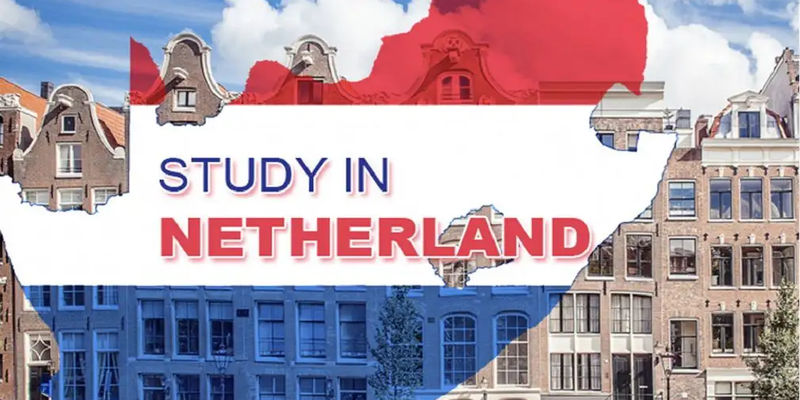Considering the Netherlands for your overseas education? Known for its excellent education system and world-recognized universities, the Netherlands offers a great opportunity. In this article, ApplyMoon provides essential information to guide you on your study abroad journey.
Why You Should Consider Studying in the Netherlands
The Netherlands offers a unique and enriching experience for international students. Here's why:
Diverse and Dynamic: Dutch universities boast a vibrant international community, with students from over 160 countries. This fosters a rich cultural exchange alongside your studies.
Top-Tier Education: Renowned for their quality, Dutch universities consistently rank high in global rankings. You'll receive a world-class education recognized by employers worldwide.
Industry-Ready Learning: The curriculum in Dutch universities is designed with the real world in mind. Expect a blend of theoretical knowledge and practical applications, preparing you for a smooth transition into the workforce. Many universities also have strong industry partnerships, opening doors to internships in your field.
Collaborative Learning: Dutch universities promote a student-centered approach. Interactive teaching methods emphasize teamwork, allowing you to collaborate with classmates from diverse backgrounds, honing your analytical and problem-solving skills.
Modern Learning Environment: Dutch universities are known for their cutting-edge facilities and contemporary course structures. You'll have access to the latest resources to enhance your learning experience.
Application Deadlines and Tips
University admissions in the Netherlands typically open in early October for the following academic year. Spring semester admissions are less common, especially for English-taught programs.

Application deadlines vary, but generally fall on April 1st for non-EU students and May 1st for EU students. Always check the university website or contact them directly for specific deadlines. Programs with limited enrollment ("numerus fixus") may have earlier deadlines (January 15th). University colleges often have a January application deadline to schedule interviews in February. While specific requirements may vary slightly between universities and programs, here's a general overview for international students:
Basic Documents:
- High School Diploma: For students from countries with only 11 years of secondary education, a preparatory course might be required to meet the Dutch 12-year standard.
- Transcripts and GPA: Official high school transcripts and grade point average.
- Motivation Letter: A compelling essay outlining your reasons for applying to the program.
- Language Test Scores: Proof of English proficiency through tests like IELTS or TOEFL (may vary by program).
- Minimum GPA: Depending on the program, you might need a minimum GPA in previous studies.
Additional Documents for Some Degrees:
- CV or Resume: Highlighting your academic and professional experience.
- Recommendation Letters: Letters from teachers or previous employers supporting your application.
- GRE/GMAT Scores: Required for Master's and PhD programs in some fields.
- Academic Portfolio: For programs where showcasing previous work is relevant.
- Study Plan: A detailed outline of your intended course selection and workload.
- Foreign Qualification Recognition:
If your diploma is from outside the Netherlands, you'll likely need an "apostille stamp" (obtained in your home country) to verify its authenticity. Additionally, an evaluation might be required to ensure it meets Dutch education standards for admission.
Application Timeline:
Decisions for Fall semester admissions typically arrive by late spring.
Non-EU Students: Upon acceptance, pay tuition for one semester and apply for a student visa immediately (application can take time). The university may assist with the visa application process. Gather necessary documents and apply for a student visa through the Dutch Immigration Department (IND) after receiving your acceptance letter.
Netherlands Student Visa: A Guide for Non-EU Students
If you're not a citizen of a European Union or European Economic Area country, you'll need a two-step process: a Netherlands student visa (MVV) and a residence permit (VVR).
The application typically involves proving your acceptance into a recognized Dutch institution, demonstrating sufficient funds to cover your stay, and showing health insurance coverage. Depending on your home country, a tuberculosis test and/or police clearance certificate might also be required.
The good news? Your visa and residence permit will usually cover the entire length of your program, with an additional three months post-graduation for job hunting! Remember, to maintain your legal status throughout your studies, you'll need to follow visa regulations and renewal procedures. Here's a checklist to get you started:
- Completed Application Form: Make sure it's signed!
- Valid Passport: With enough blank pages and validity beyond your stay.
- Passport Photos: Two recent color photos.
- Acceptance Letter: The official document from your Dutch university.
- Financial Proof: Documents showing you can cover living expenses.
- Travel & Health Insurance: With minimum coverage requirements.
- Academic Transcripts: Certified copies from previous schools.
- Tuberculosis Test (Optional): Depending on your origin country.
- Biometrics (Optional): Fingerprints and facial photographs may be required.
Some universities require English proficiency test scores like IELTS or TOEFL. Check with your chosen university for specific requirements.
Students with Dependents
International students in the Netherlands on a student visa may be eligible to have their spouse/registered partner and children under 18 join them. Here's a breakdown of the conditions. Your partner can apply for a residence permit to live with you in the Netherlands, but there are a few things to consider:
- Full-Time Studies: You'll need to be enrolled in a full-time accredited program at a recognized Dutch institution.
- Meeting Immigration Criteria: Dutch immigration will assess your situation based on specific requirements.
Your children can also come to the Netherlands, but they must:
- Be Financially Dependent: They must rely on you financially.
- Meet Additional Requirements: Dutch immigration regulations might have further stipulations.
Netherlands Tuition Fees and Living Expenses
The Netherlands offers a range of universities catering to international students, but costs can vary depending on your background. Here's a breakdown:
EU/EEA vs. Non-EU/EEA: EU/EEA students enjoy lower "statutory tuition fees" set by the government, typically around €2,530 annually. Non-EU/EEA students pay "institutional tuition fees" which vary by university, often ranging from €6,000 to €20,000 per year.

Sample Tuition Fees for Top Universities:
- Delft University of Technology (QS Rank: 47) - €15,000 - €19,000
- University of Amsterdam (QS Rank: 53) - €9,000 - €20,000
- Utrecht University (QS Rank: 107) - €10,000 - €20,000
Living Expenses:
The cost of living also varies depending on your chosen city. Here's a comparison of average monthly living expenses in popular student cities:
- Amsterdam: €800 - €1450
- Tilburg: €710 - €1210
- Rotterdam: €750 - €1200
- Delft: €775 - €1210
- Utrecht: €800 - €1100
- The Hague: €800 - €1200
Working While Studying in Netherlands
Looking to gain some work experience alongside your studies in the Netherlands? Great news! International students on a visa can work part-time under certain conditions.
Part-Time Work During Studies:
- Non-EU/EEA/Swiss Students: This applies specifically to you.
- Hours: Up to 16 hours per week during the academic year (September-June).
- Summer and Holidays: Full-time work (40 hours/week) is allowed during July, August, and official holidays.
- Priorities: Remember, your studies come first! Ensure work doesn't interfere with your academic commitments.
Beyond Graduation:
Thinking of staying in the Netherlands after you graduate? The Orientation Year (Zoekjaar) visa might be your answer! What is the Zoekjaar Visa?
This visa is designed to help international graduates find their footing in the Dutch job market. It allows you to live and work in the Netherlands for one year after graduation, giving you time to:
- Job Search: Explore various employment opportunities across different industries and roles.
- Start a Business: If entrepreneurship is your passion, this visa provides the chance to launch your venture.
Eligibility for the Zoekjaar Visa:
- Recent Graduate: You must have completed a Bachelor's, Master's, or Ph.D. within the past three years, either from a recognized Dutch institution or a qualifying international program.
- Financial Support: Be prepared to demonstrate sufficient funds to cover your living expenses during the year.
- Health Insurance: Valid health insurance coverage is also required.
Conclusion
Congratulations on deciding to study abroad in the Netherlands! An exciting adventure awaits you. To start, focus on practical matters like applying to the university. This task can be time-consuming, so it’s best to begin early. Additionally, consider arranging other essentials such as your visa (if applicable), booking your trip to the Netherlands, and finding suitable housing. ApplyMoon can assist you throughout this process. By following the outlined steps and utilizing recommended resources, you can confidently embark on your study abroad journey.
